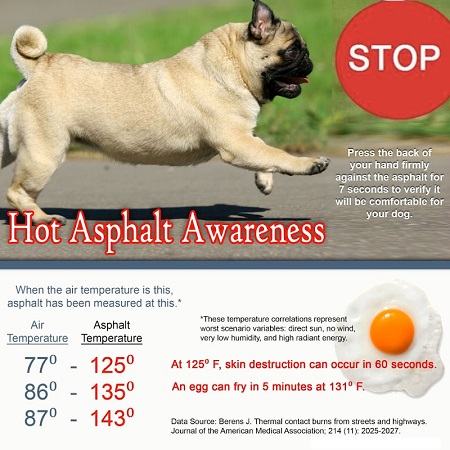Weather Woes
Hot Weather Tips
- Overheating can kill an animal. Never leave an animal alone inside a vehicle, since even with the windows open, a parked car, truck or van can quickly become a furnace. Parking in the shade offers little protection, as the sun shifts during the day.
- Don't force an animal to exercise after a meal in hot, humid weather. Always exercise him/her in the cool of the early morning or evening.
- In extremely hot weather don't leave you dog standing on the street, and keep walks to a minimum. He/she is much closer to the hot asphalt, and his/her body can heat up quickly. A dog's paws can burn since they are not protected by shoes.
- Always provide plenty of shade for an animal staying outside the house. Always provide plenty of cool, clean water for your animals to drink.
- If your pet is inside, provide access to shade, water and cool air whether from open windows or air conditioning.
Most veterinarians don't recommend shaving dogs or cats, since the hair helps them insulate against heat.
- Avoid walking your dog in areas that you suspect have been sprayed with insecticides or other chemicals, as poisonings increase during the summer. Call your veterinarian or the SPCA National Animal Poison Control Center (ASPCA/NAPCC) if you suspect your animal has been poisoned.
Southbury Animal Control conducts routine patrols of all the local parking lots during the summer months, it is considered Animal Cruelty to leave your pet in a parked vehicle. If you see a pet in a parked vehicle please call the office at (203) 262-0613.

Cold Weather Tips
- The ideal place for your pets in cold weather is indoors where they have shelter from cold temperatures, drifting snow, and ice.
- Outdoor pets require shelter with insulation, fresh food and water that doesn't freeze. Consider an electric bowl heater to keep water from freezing outdoors.
- To keep dogs comfortable during cold weather is to increase the energy content of the food. This could be done by adding fats to the daily ration by mixing in some meat grease, gravy, scraps or suet for a readily digestible high energy boost.
- If you take your pet outside in snowy or icy weather, be sure to check its paws for cuts or ice balls.
- After walking on pavement treated with salt or chemical snow removers, wipe your pet's paws with a damp cloth.
- Antifreeze (containing ethylene glycol) poses a special danger to pets in winter. Both dogs and cats are attracted by the sweet taste, and mere teaspoonfuls can cause kidney damage or death. If you keep cars and pets in your garage, be sure your radiator does not leak. If you suspect your pet has ingested antifreeze, contact your veterinarian immediately.
- Carbon monoxide poisoning is another potential problem for pets kept in the garage with vehicles during winter months. Never start your car and let it warm up in the garage.
- Cat outdoors in the cold weather will often climb up into the warm engine compartment of vehicles, where it can get caught in one of the engine's belts when the car is started again. Banging on the hood a few times before getting into the car will wake the cat that may be sleeping inside.